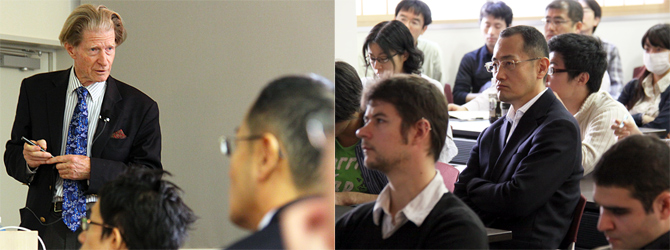Shinya Yamanaka and Sir John Gurdon Win Nobel Prize in Medicine

October 9, 2012
The Nobel Assembly at Karolinska Institutet announced on the 8th that it has named Dr. Shinya Yamanaka, Director and Professor of Kyoto University's Center for iPS Cell Research and Application (CiRA) and Principal Investigator at the Institute for Integrated Cell-Material Sciences (WPI-iCeMS), together with Sir John B. Gurdon of the University of Cambridge, as recipients of this year's Nobel Prize in Physiology or Medicine. The discoveries of Drs. Yamanaka and Gurdon have shown that mature cells can be reprogrammed to become pluripotent (turning them back into immature cells capable of giving rise to all cell types in the body). Please see the links below for further details.
Comment from WPI Program Committee Chairperson Hiroo Imura
On the announcement of this year's Nobel Prize in Physiology or Medicine for Dr. Shinya Yamanaka, Principal Investigator at the Institute for Integrated Cell-Material Sciences (WPI-iCeMS)
Today, the Nobel Committee at Karolinska Institute announced that it has named Dr. Shinya Yamanaka, Principal Investigator at the Institute for Integrated Cell-Material Sciences (WPI-iCeMS) as one of the recipients of this year's Nobel Prize in Physiology or Medicine. iCeMS is a research center at Kyoto University selected by the World Premier International Research Center Initiative (WPI) of the Japanese Government.
I extend my heartiest congratulations to Dr. Yamanaka and every person involved.
Dr. Shinya Yamanaka has been Principal Investigator at WPI-iCeMS since its foundation in 2007. His receipt of the prize shows an evidence that the research center inaugurated by the WPI program has been the research platform in which world's finest brains gather. We, at the WPI Program Committee, are very grateful to learn today's announcement.
We will continue to forward the WPI program in order to establish "World Premier International Research Centers" in both name and reality, sincerely hoping that splendid achievements for human kind to appear one after another from the centers, including the Nobel Prize.
Hiroo Imura
Chairperson of the WPI Program Committee
World Premier International Research Center Initiative (WPI)
October 8, 2012
Source: ![]() Ministry of Education, Culture, Sports, Science and Technology (MEXT)
Ministry of Education, Culture, Sports, Science and Technology (MEXT)
Comment from iCeMS Director Norio Nakatsuji
I wish to express my warmest congratulations to Prof. Yamanaka upon receipt of the Nobel Prize. Speaking as an iCeMS and Kyoto University Institute for Frontier Medical Sciences professor, and also as a colleague in the same field, I believe that this is truly a groundbreaking achievement.
Your discovery, proving that differentiated cells in our bodies, such as in the skin and liver, can be artificially reprogrammed into pluripotent stem cells behaving much like undifferentiated embryonic stem cells, is a tremendous contribution to the history of biology. It is my sincerest hope that this highest form of scientific recognition will accelerate basic research leading to an eventual total unravelling of this new field, and also that this novel technology leads to various medical applications.
Norio Nakatsuji
Director and Professor
Kyoto University Institute for Integrated Cell-Material Sciences (WPI-iCeMS)
October 8, 2012
Photos

Sir John Gurdon (left) speaking at the 61st iCeMS Seminar with Prof. Shinya Yamanaka (right) in the audience (November 29, 2010, iCeMS Main Building)
Related links
- "
 CiRA Director Shinya Yamanaka Wins the Nobel Prize in Medicine". Kyoto University CiRA website. 8 Oct 2012
CiRA Director Shinya Yamanaka Wins the Nobel Prize in Medicine". Kyoto University CiRA website. 8 Oct 2012 - "
 CiRA Director Professor Shinya Yamanaka had a press conference". Kyoto University website. 8 Oct 2012
CiRA Director Professor Shinya Yamanaka had a press conference". Kyoto University website. 8 Oct 2012 - "
 CiRA Director Yamanaka won the Nobel Prize!". Kyoto University website. 8 Oct 2012
CiRA Director Yamanaka won the Nobel Prize!". Kyoto University website. 8 Oct 2012 - "
 The 2012 Nobel Prize in Physiology or Medicine - Press Release". Nobelprize.org. 8 Oct 2012
The 2012 Nobel Prize in Physiology or Medicine - Press Release". Nobelprize.org. 8 Oct 2012
About iCeMS and CiRA
Prof. Shinya Yamanaka, a principal investigator at the Institute for Integrated Cell-Material Sciences (WPI-iCeMS), reported in November 2007 that his team had successfully generated induced pluripotent stem cells (iPS cells) from human skin cells.
In January 2008, iCeMS Director Norio Nakatsuji appointed Prof. Yamanaka as founding director of the Center for iPS Cell Research and Application (CiRA), which was established under the auspices of iCeMS in order to advance iPS cell research.
In April 2010, Kyoto University re-established CiRA as a full-fledged university research institute, with Prof. Yamanaka as its founding director. Since that time, both institutes have continued to collaborate closely as sister institutes, with iCeMS aiming to integrate the cell and material sciences, contributing to the advancement of stem cell research such as with ES and iPS cells, and CiRA continuing its pioneering work in the areas of regenerative medicine and drug development using iPS cells.
